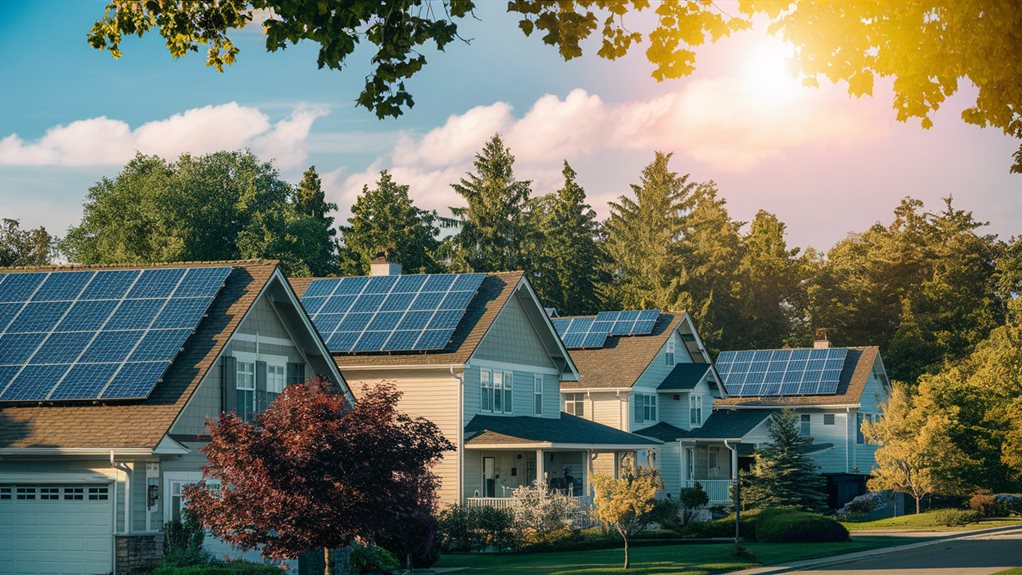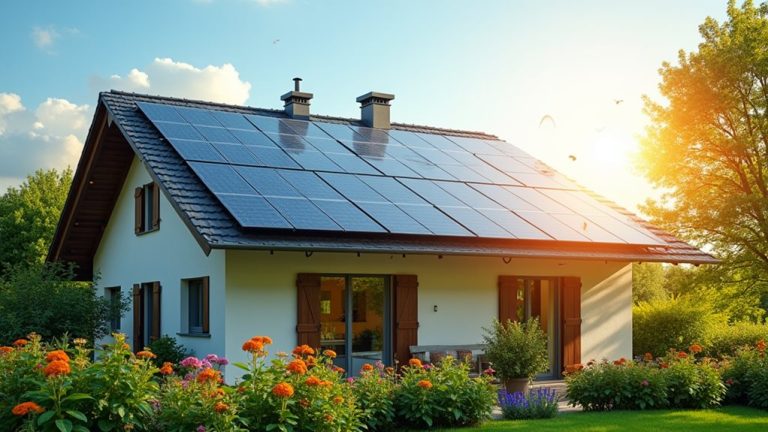As global energy demands surge and concerns about climate change intensify, the pursuit of energy independence has become a critical discussion. Residential solar power emerges as a viable solution, offering homeowners the opportunity to generate their own clean energy. By shifting to solar, individuals can drastically reduce their reliance on traditional power grids, resulting in both economic and environmental benefits. However, achieving complete energy independence involves understanding complex factors, such as the efficiency of solar panels, financial incentives, and state-specific regulations. Could solar power truly redefine energy autonomy in residential settings? The answer might be more accessible than you think.
Expert Highlights
- Residential solar power systems reduce reliance on traditional power grids, promoting energy independence.
- Solar panels allow homeowners to control their energy usage, enhancing self-sufficiency.
- Using solar energy can stabilize personal energy costs and reduce vulnerability to utility rate increases.
- Advanced photovoltaic technology maximizes energy output, supporting sustainable energy independence.
- Substantial tax incentives and rebates make the transition to solar more affordable, encouraging energy independence.
Definition of Residential Solar Power
Residential solar power refers to the utilization of solar panel systems, which transform sunlight into electricity for home use, thereby offering considerable environmental and economic benefits. These systems not only promote energy independence and reduce reliance on traditional power grids but also lower utility bills, contributing to substantial cost savings over time. Generating one's own power through renewable sources reduces reliance on local utility providers and strengthens energy independence. Additionally, advances in solar technology have enhanced system efficiency and affordability, making residential solar power a viable option for many homeowners seeking sustainable energy solutions.
Understanding Solar Panel Systems
Solar panel systems represent a transformative solution for harnessing renewable energy in residential settings. These systems convert sunlight into electricity through the photovoltaic effect. The renewable nature of solar energy makes it a reliable and environmentally-friendly energy source for homes. Major components include panels, inverters, batteries, and charge controllers. Panels collect solar energy, inverters change it into usable AC power, and batteries store excess energy. Secure mounting guarantees ideal performance. Monitoring equipment enhances operational efficiency by tracking energy flow and performance.
#
Benefits
of Solar Energy
Tapping into the benefits of solar energy offers transformative potential for homeowners by delivering both financial and environmental rewards.
These advantages include:
- Financial Savings: Lower electricity bills and the potential for additional revenue through net metering. Homeowners can significantly reduce their monthly expenses due to decreased reliance on traditional utility companies.
- Environmental Benefits: Significant reduction in carbon emissions supports a sustainable future.
- Energy Independence: Enhanced control over energy usage diminishes reliance on utility grids.
Cost and Efficiency Factors
Beyond the compelling benefits of harnessing solar energy, understanding the cost and efficiency factors associated with residential solar power is paramount for making informed investment decisions. Decreasing installation costs, spurred by technological advancements and consumer demand, make solar power more accessible. Efficiency factors, such as climatic conditions and solar panel design, substantially influence performance. For instance, solar panels degrade over time, with the quality of the panel dictating the rate of efficiency loss. Knowledge of these aspects aids in maximizing energy output and economic benefits.
## Benefits
Residential solar power offers a multitude of benefits, particularly in reducing electricity bills as homeowners offset traditional energy consumption with solar energy. Additionally, solar installations contribute to environmental sustainability by minimizing carbon footprints and decreasing reliance on fossil fuels. Homeowners also experience increased property values and greater independence from the energy grid, fostering financial and operational stability. With the increasing affordability of solar panels, more homeowners are finding the investment worthwhile, as they can take advantage of state incentives and federal tax credits.
Lower Electricity Bills
Solar power offers a compelling opportunity to drastically lower electricity bills for homeowners. In North Carolina, excess solar energy offsets the cost of energy sent to grid, which further enhances the financial benefits. By investing in solar panels, individuals can enjoy significant financial benefits:
- Substantial Monthly Savings: Expect an average reduction of $100 to $150 monthly.
- Long-Term Financial Gain: Potential annual savings exceeding $1,600.
- Dynamic State Savings: Variances based on state-specific electricity rates and usage.
These mechanisms reflect solar power's potential to minimize costs compellingly.
Environmental Impact Reduction
In addition to substantial financial savings, opting for solar energy also offers significant environmental benefits. Solar power reduces air pollution by minimizing reliance on fossil fuels, thereby improving air quality and decreasing greenhouse gas emissions. With zero emissions during operation, solar energy contributes to water conservation and land preservation, making it a sustainable choice to combat climate change and protect natural resources. Additionally, solar power production does not contribute to greenhouse gas emissions, helping to create a cleaner and more sustainable energy ecosystem.
Increased Property Value
Opting for solar energy installation can substantially increase a property's market value. Value Addition: In California, solar panels can add approximately $4 per watt or around $20,000 for a 5,000-watt system. Homes with solar systems increased home value more than most other home improvements. Faster Sales: Homes with solar systems sell 20% faster and for 17% more than those without. Market Studies: Research shows property value boosts by 3-4% with solar installations.
Energy Grid Independence
Beyond the financial benefits related to property value, harnessing solar energy empowers homeowners with enhanced energy grid independence. By reducing reliance on non-renewable sources, solar systems stabilize energy costs and protect against rate hikes. Transitioning to solar power also leads to a reduction in carbon emissions and supports efforts to protect air and water quality. They bolster grid reliability and resilience by offering decentralized power generation and backup during outages. Additionally, residential solar power decreases grid strain, aiding in the prevention of blackouts and ensuring a smoother energy system.
Solar Tax Incentives Available
Exploring the domain of solar tax incentives is essential for homeowners contemplating solar installations, as several programs substantially reduce upfront costs. Federal tax credits offer a substantial deduction, with specific rates and eligibility criteria varying based on the installation date. Energy Trust incentives and federal tax credits can reduce solar or solar + storage costs by about one-third. Additionally, state-specific programs and a guide for calculating solar savings further enhance the financial benefits available to homeowners.
| Incentive Type |
Amount/Rate |
Eligibility Criteria |
| Federal Tax Credit |
30% |
Systems installed before Jan 1, 2033 |
| New York State Credit |
Up to 25% or $5,000 |
Installed on homes within New York |
| Fort Collins Rebate | $200/kW-DC (max $1,000) | Systems installed by Participating Solar Contractor
Federal Tax Credits Overview
The Federal Tax Credit for solar energy systems, known as the Investment Tax Credit (ITC), offers significant financial incentives for homeowners looking to install solar power.
To qualify:
- Eligibility: System must be owned, installed at a primary/secondary residence, and completed during the tax year.
- Amount: Provides 30% credit through 2032.
- Claiming: Use IRS Form 5695 alongside Form 1040 for claiming.
State-Specific Incentive Programs
While federal incentives serve as a robust starting point for solar adoption, state-specific programs offer additional financial advantages tailored to localized needs.
Arizona provides tax credits and exemptions, plus net billing arrangements.
Connecticut exempts solar installations from sales and property tax, offering unique programs for low-income households.
Massachusetts incentivizes with rebates and net metering, while New York focuses on income-based incentives and net metering benefits.
Solar Savings Calculation Guide
Understanding the potential savings and financial benefits of residential solar power is essential for homeowners considering solar energy installation. Key incentives include:
- Federal Tax Credits: The Solar Investment Tax Credit offers up to 30% of installation costs.
- State and Utility Incentives: Availability varies; check local programs.
- Solar Renewable Energy Certificates (SRECs): Gain additional income by sending excess energy to the grid.
These incentives reduce net costs substantially.
FAQ
How Long Does It Take to Install a Residential Solar System?
The installation of a residential solar system typically spans from 60 to 90 days but can extend up to six months. This timeframe includes project complexity, permits, equipment availability, scheduling, and post-installation inspections and approvals.
What Are the Maintenance Requirements for Solar Panels?
Solar panels require low maintenance, with periodic cleaning two to four times annually. Professional cleaning is recommended biannually, alongside regular inspections for damage, debris, or nests. Adhere to safety guidelines and utilize eco-friendly cleaning solutions.
Can Solar Panels Power a Home During a Blackout?
Solar panels alone typically cannot power a home during a blackout due to grid-tied system constraints. However, integrating solar with battery storage allows continued operation by storing excess energy for use during power outages.
How Does Shading Affect Solar Panel Performance?
Shading can severely impact solar panel efficiency, with even minimal shading reducing output by 50-80%. It affects the entire panel's performance, limiting current flow like the "weakest link." Solutions include strategic placement and advanced inverter technology.
What Is the Lifespan of Residential Solar Panels?
The lifespan of residential solar panels ranges from 25 to 30 years. Longevity depends on material and manufacturing quality, environmental conditions, and maintenance. Degradation rates are approximately 0.4% annually for panels produced post-2000, enhancing output sustainability.
Experts Final Thoughts
The move to residential solar power represents a pivotal shift towards energy independence, characterized by the utilization of solar panel systems to harness renewable energy. The benefits—marked by reduced utility costs, increased property value, and substantial carbon emission reductions—underscore solar energy's growing importance. Enhanced affordability and tax incentives further amplify its appeal, making solar energy a viable investment. This transition greatly contributes to developing a resilient and decentralized energy infrastructure, promoting economic and environmental sustainability.











